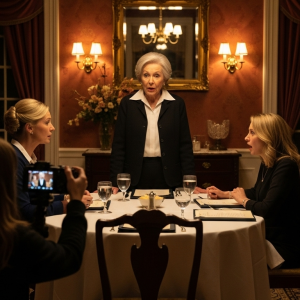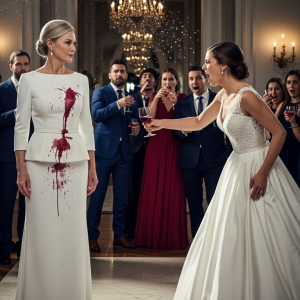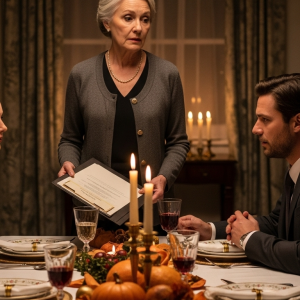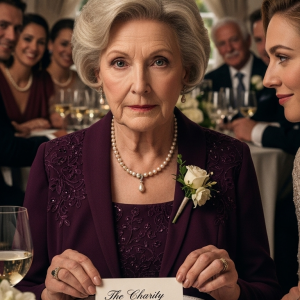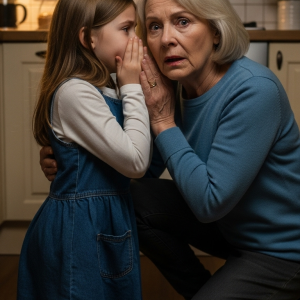They dumped me in a nursing home like yesterday’s garbage. They thought my story was over, a final chapter written in beige walls and the smell of antiseptic. But they didn’t know that I was the one holding the pen.
The day they took me, the sky was a flat, ugly gray. Karen, my daughter, had called that morning, her voice a syrupy sweet poison, saying she and my sons, David and Luke, were coming to “help me organize.” I should have known that “help” was a word they only used when they wanted to take something.
I sat at my kitchen table, the one where I’d braided their hair and served their birthday cakes. I’d even set out four cups for coffee. Silly me. I still wanted to look nice for them, to be loved by them.
The door slammed. Karen walked in first, brisk and business-like. David followed, eyes glued to his phone. Luke came last, holding a sheaf of papers I didn’t like the look of. “Mom,” Karen began, with the soft, patronizing tone one uses on a child, “we’ve been talking.”
She told me they’d found a “resort-style living facility” for me. It sounded like a commercial for a place you go to die. I blinked, my heart a frantic drum against my ribs. “I’m not going anywhere,” I said, my voice calmer than I felt. “This is my home.”
Luke slid the papers across the table. “Mom, you’ve been forgetting things. We’re just trying to protect you.” Protect me from what? My own life? I stared at my hands—hands that had stitched their costumes, packed their lunches, and worked two jobs after their father died to keep this very roof over our heads.
“You already signed the power of attorney papers, Mom,” Karen said softly. The floor gave way beneath me. I vaguely remembered signing something after a bad fall, when Karen had shown up with Chinese food and an “urgent form.” I trusted them. They were my babies. I never thought they’d weaponize my trust against me.
Within an hour, a single suitcase was packed. They didn’t even let me choose which photos to take. They took my house, my memories, my life—all in a single afternoon.
The ride to Oak Hills Senior Living was silent. We pulled into a beige complex tucked between a gas station and a dry cleaner’s. No trees, no garden, just beige walls and a woman in scrubs with a smile that was too hard.
That first night, I cried until I had nothing left. Not for the cold room or the tasteless food, but because my children had stopped seeing me as a person. I was just a problem they had solved.
But I am not one for staying down. I spent the next few weeks in quiet observation. I saw the kind but overworked staff and the other residents, ghosts in cardigans waiting for the end. And then I saw Ruth. She was playing poker, cackling like a movie villain. “You bet your lunch money on that hand, baby?” she shouted at a nurse, slapping down her cards.
I smiled for the first time in weeks. She noticed. “You new?” she asked, tilting her head. “You’ve got that freshly-betrayed-by-family look.” I laughed. A real, actual laugh.
Soon, our circle formed. There was Doie, a sweet former librarian with a will of steel, and Maxine, a tough, retired law professor with eyes that had seen it all. We were a collection of forgotten women in a place built on surrender.
One night, I told them my story. When I finished, Maxine raised an eyebrow. “Did you sign over the deed to the house?”
“No,” I shook my head. “I think… I think I still legally own it.”
Ruth let out a low whistle. “Honey, if that’s true, you’ve got gold under your feet and fire in your hands.” And just like that, a flicker of rebellion ignited in the dim light of the nursing home lounge.
It started in my room, with my old leather folio I’d found tucked in my suitcase. Inside, pristine and legal, was the original deed to my house. My name, and my name alone, was on it. The rage I had buried came rushing back. They hadn’t just put me here for my “safety.” They were planning to sell my home.
That afternoon, in the privacy of Maxine’s room, we laid out the documents. “You didn’t sign over the title,” Maxine confirmed, tapping the paper with a red-painted nail. “They have control over your medical decisions, sure. But the house is still yours.”
My heart thudded. “Can they still sell it?”
“Not if you sell it first,” she said, a slow, dangerous smile spreading across her face.
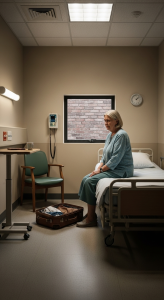
It was a quiet revolution, plotted over lukewarm coffee and bingo nights. Ruth resurrected the phone number of an old flame who was now a top real estate agent. Doie, our tech wizard, set up a secret email account on the community computer. Maxine handled the legal calls, her voice transforming from a sweet old lady to a razor-sharp attorney in an instant.
The house sold in less than a day. The money was wired to a new bank account that Doie helped me open online. No one suspects little old ladies of plotting an escape.
Our final step was to disappear. We picked a Friday during bingo night. Ruth bribed a young aide with perfume and a pizza to “forget” checking my room. With one small suitcase and three one-way tickets to Rome, I left a single note on my pillow.
Don’t look for me. I’ve gone to find the life you stole.
As the plane took off, the Texas lights sparkled below like tears I refused to shed. They had taken everything, which meant I had nothing left to lose. And that, I realized, made me the most dangerous woman in the world.
Rome smelled like fresh bread, old stone, and freedom. We checked into a small hotel where the clerk didn’t blink at four gray-haired American women with suspiciously little luggage. For the first time in years, I wasn’t somebody’s burden or discarded mother. I was Eleanor Grace Miller, alive.
But freedom has a way of stirring up ghosts. One night, I foolishly checked my email. Ten messages from Karen. The subject line of the last one read: “WHAT HAVE YOU DONE?” I didn’t need to open it. I could hear the panic, the fury. The house was gone. The money was gone. And so was I.
Maxine found me on the terrace. “They had a choice, Ellie,” she said softly. “They chose themselves. You just finally chose you back.”
Then, in a tiny rental in Florence, I found the letters. They were from George, tucked into a hidden pocket of my suitcase, written in the years before he died. He wrote of his fears, of noticing his children’s entitlement and manipulation, of how they saw me.
The last letter, written just weeks before his heart gave out, shattered me. Ellie, if you’re reading this, I hope to God I was wrong. But if they’ve turned on you, please remember this. You are worth more than what they’ve made you believe. Don’t let them bury you before your time. Fight back.
He knew. Even then, he knew. The next morning, I told the girls. Ruth was the first to speak. “Then we raise hell,” she declared. Maxine nodded grimly. “We go public. We tell your story. All of it.”
My quiet escape had just become a mission. We contacted a journalist in New York, and my story exploded. The podcast episode was downloaded hundreds of thousands of times. I became a symbol for countless women who had been silenced. My phone buzzed with a number I didn’t recognize. I expected a reporter.
Instead, a small, trembling voice said, “Grandma? It’s Emily. I know what they did. Please don’t hang up.”
The past wasn’t done with me. Emily, my youngest granddaughter, had found George’s letters by accident. She told me she had confronted her mother, Karen, who had slapped her for her insolence. “I couldn’t stay after that,” she whispered over the phone.
Maxine warned me it could be a trick. But Doie said, “Sometimes healing means opening a door, just one more time.”
I chose the meeting place: Savannah, Georgia. Emily was waiting for me in a park, sitting beneath a moss-draped oak. She was sixteen, still half a girl, but her eyes held a sorrow that was centuries old. “Hi, Grandma,” she said, and we both started to cry.
We walked for hours. I looked at this young woman, who had chosen truth over family, and the anger in my heart finally began to dissolve. It wasn’t revenge I wanted. It was restoration. I hugged her, and it felt like hugging the future.
That night, Emily turned to me, her eyes shining. “What if we started something?” she said. “A place for women like you. For women who need to be reminded they’re not done yet.”
The Eleanor Grace Foundation began as an idea scribbled on a napkin. Emily took the lead, her sharp mind and fierce heart driving us forward. We started small: a free legal clinic, support groups on Zoom. Our mission was simple: to restore the dignity that had been stolen from so many women.
The foundation grew. We opened our first home in upstate New York, a safe haven for women displaced by family abuse. We called it Grace House. When we cut the ribbon, I cried so hard my knees buckled. Ruth had to hold me up.
The children I left behind tried to fight back. Luke sued me; the case was dismissed. Karen left voicemails I never listened to. David disappeared. They were ghosts from a life I no longer lived.
My new life was full. Ruth found love on a cruise to Alaska. Doie started a popular poetry blog. Maxine became our foundation’s fiery legal director. And I, I sat on the porch of Grace Haven every morning, a cup of coffee in hand, and watched as women arrived with broken stories and left with light in their eyes.
It was our first Thanksgiving at Grace Haven. The long dining table was filled with twenty-two women—survivors, fighters, queens. I stood to give a toast.
“This year,” I began, my voice clear and strong, “I didn’t lose everything. I found everything I was missing.” I looked at Emily, my legacy, standing beside me. “I found family, not by blood, but by choice. This isn’t just a home for the broken. It’s a home for the rising.”
Later, Emily joined me on the porch as the stars began to appear. “You’re changing the world, Grandma,” she said softly.
“No, baby,” I whispered, pulling her close. “We are.” And we sat there, two generations of fire, watching the sky fill with tiny promises, just waiting for a new day to begin.
Winter came softly to Savannah. Unlike the sharp cold I remembered from Texas, here it arrived like a gentle hush. Crisp mornings, the scent of pine and clove in the air, soft blankets, and slower walks under grey skies. Grace Haven glowed with string lights and quiet miracles. Each room now held a story, a life being carefully pieced back together.
There was Clara, who arrived with only a suitcase and a photograph of her late husband. Her children had emptied her bank account and left her in a motel two towns over. She didn’t speak much at first, but after a few weeks in our new greenhouse, her hands found their way back to the earth, and then to her own voice.
Then there was Naomi, a former nurse who had been placed in assisted living against her will. She now taught chair yoga in the sunroom, her calm voice leading breathing exercises for women whose hearts were still learning to trust the rhythm of their own breath again. Every time someone new arrived, I saw myself in her—a reflection of the woman I was in that beige nursing home, faith slipping from my fingers. And each time I welcomed her in, I felt myself grow stronger.
In January, a woman named Maria arrived. She was a ghost wrapped in a worn coat, her shoulders hunched against a storm only she could feel. Her son, a man with a gentle voice and a portfolio of fabricated medical documents, had convinced a judge that his mother’s “advancing dementia” made her unable to manage her own affairs. He had sold her home and placed her in a state-run facility, all while slowly siphoning her life savings into his own accounts.
I sat with her in the library Doie had so lovingly curated. Maria wouldn’t meet my eyes. She just stared at her trembling hands, folded in her lap. I didn’t offer her pity. I offered her recognition.
“They make you feel like you’re disappearing, don’t they?” I said softly. “A little bit at a time. Until you start to wonder if the person they see is the person you’ve actually become.”
For the first time, she looked up. Her eyes, a cloudy blue, held a flicker of something that wasn’t fear. It was the shock of being seen.
The Grace Haven method, as Ruth jokingly called it, went into action. It wasn’t a program; it was a community. Maxine took one look at Maria’s legal papers and her eyes turned to steel. “This isn’t just theft,” she declared, spreading the documents on the dining table like a battlefield map. “This is a textbook case of undue influence and coordinated fraud. Oh, honey, we can fight this.”
Doie, meanwhile, learned that Maria had once been an avid botanist. She spent two days searching online and in old bookstores before presenting Maria with a heavy, illustrated book on rare orchids. Maria traced the drawings with a fingertip, and for a moment, the ghost in her eyes was replaced by a scholar.
And Ruth? Ruth simply sat with her, talking about the terrible contestants on a TV baking show and sharing gossip about her boyfriend, Dennis. She made Maria laugh. It was a small, rusty sound, but it was a start. The first laugh after a long silence is the sound of a soul beginning to crack open.
The breakthrough came a month later, in the greenhouse. The air inside was warm and humid, a pocket of manufactured spring in the heart of winter. Maria was repotting a fern, her movements slow but sure. I was working nearby, trimming dead leaves from a rose bush.
“He told me the garden was too much for me,” Maria said suddenly, her voice barely a whisper. “That I kept forgetting to water the plants, letting them die.” She paused, her hands still in the rich, dark soil. “But I never forgot, Eleanor. He was the one adding salt to the soil at night. Just a little at a time. So my roses would wilt and my hydrangeas would turn brown.”
She finally looked at me, her face a mask of dawning, terrible clarity. “He wasn’t just stealing my money. He was stealing my reality.”
The cruelty of it took my breath away. This was a deeper betrayal than a forged signature or a stolen deed. This was the systematic destruction of a person’s confidence in her own mind. I walked over and placed my hand over hers. It was cold, but no longer trembling.
“I believe you,” I said. And in that small, warm greenhouse, surrounded by the scent of earth and new life, Maria began to cry. Not tears of sorrow, but tears of rage. And I knew she was going to be alright.
By the time spring bloomed for real, covering Savannah in a riot of azaleas and dogwood, Maria was a different woman. With Maxine’s ferocious legal help, she had successfully challenged her son’s conservatorship. A judge had frozen his assets pending a full criminal investigation. Maria wouldn’t get all her money back, but she got something more valuable: her name, her freedom, and her sanity.
She became the unofficial queen of the Grace Haven greenhouse. She started a program, teaching other residents the art of grafting roses and cultivating herbs. She was no longer a victim; she was a mentor. Her hands, once trembling with fear, were now steady, covered in soil, guiding others toward the light.
One afternoon, I sat on the porch, watching Maria show Clara how to prune a struggling gardenia. She was laughing, her voice confident and clear. I thought about the fire of my own anger, the vengeful journey that had led me here. Revenge had been the wild, uncontrolled burn that cleared away all the dead wood and rot in my life.
But this, I thought, watching the two women work together in the sun, this is the garden that grows in the fertile ash. This is the legacy. It wasn’t about winning a battle against the children who had wronged me. It was about cultivating a sanctuary where women could remember how to grow again.
Emily came and sat beside me, resting her head on my shoulder. “Look at what you built,” she whispered.
I smiled, my heart full. George had asked me to fight back. I had. But I never imagined that the greatest victory wouldn’t be in tearing something down, but in building something that would outlive the pain, outlive the anger, and continue to bloom, season after season.
